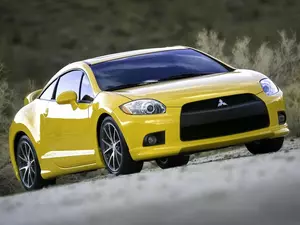
| Vehicle | Curb weight | Difference from world's smallest | Weight to power ratio | 0—60 mph acceleration ratio | Consumption ratio |
|---|---|---|---|---|---|
| 2.4L |
1495 kg / 3296 lbs |
1070 kg (2359 lbs) heavier | 9 kg to 1 hp | 168 kg/s (370 lbs/s) | - |
| GT 3.8L V6 MIVEC |
1608 kg / 3546 lbs |
1183 kg (2609 lbs) heavier | 6 kg to 1 hp | - | - |
| Vehicle | 2.4L |
|---|---|
| Curb weight |
1495 kg / 3296 lbs |
| Difference from world's smallest | 1070 kg (1070 lbs) heavier |
| Weight to power ratio | 9 kg to 1 hp |
| 0—60 mph acceleration ratio | 168 kg/s (370 lbs/s) |
| Consumption ratio | - |
| Vehicle | GT 3.8L V6 MIVEC |
| Curb weight |
1608 kg / 3546 lbs |
| Difference from world's smallest | 1183 kg (1183 lbs) heavier |
| Weight to power ratio | 6 kg to 1 hp |
| 0—60 mph acceleration ratio | - |
| Consumption ratio | - |
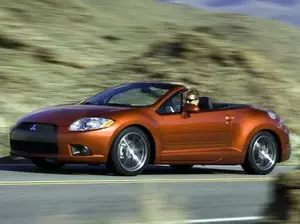
| Vehicle | Curb weight | Difference from world's smallest | Weight to power ratio | 0—60 mph acceleration ratio | Consumption ratio |
|---|---|---|---|---|---|
| 3.8L V6 MIVEC |
1707 kg / 3764 lbs |
1282 kg (2827 lbs) heavier | 6 kg to 1 hp | - | - |
| GS 2.4L |
1595 kg / 3517 lbs |
1170 kg (2580 lbs) heavier | 10 kg to 1 hp | - | - |
| Vehicle | 3.8L V6 MIVEC |
|---|---|
| Curb weight |
1707 kg / 3764 lbs |
| Difference from world's smallest | 1282 kg (1282 lbs) heavier |
| Weight to power ratio | 6 kg to 1 hp |
| 0—60 mph acceleration ratio | - |
| Consumption ratio | - |
| Vehicle | GS 2.4L |
| Curb weight |
1595 kg / 3517 lbs |
| Difference from world's smallest | 1170 kg (1170 lbs) heavier |
| Weight to power ratio | 10 kg to 1 hp |
| 0—60 mph acceleration ratio | - |
| Consumption ratio | - |
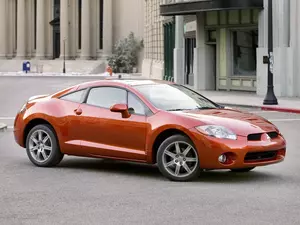
| Vehicle | Curb weight | Difference from world's smallest | Weight to power ratio | 0—60 mph acceleration ratio | Consumption ratio |
|---|---|---|---|---|---|
| GT 3.8L V6 MIVEC |
1575 kg / 3473 lbs |
1150 kg (2536 lbs) heavier | 6 kg to 1 hp | - | - |
| 2.4L |
1485 kg / 3274 lbs |
1060 kg (2337 lbs) heavier | 9 kg to 1 hp | 167 kg/s (368 lbs/s) | - |
| Vehicle | GT 3.8L V6 MIVEC |
|---|---|
| Curb weight |
1575 kg / 3473 lbs |
| Difference from world's smallest | 1150 kg (1150 lbs) heavier |
| Weight to power ratio | 6 kg to 1 hp |
| 0—60 mph acceleration ratio | - |
| Consumption ratio | - |
| Vehicle | 2.4L |
| Curb weight |
1485 kg / 3274 lbs |
| Difference from world's smallest | 1060 kg (1060 lbs) heavier |
| Weight to power ratio | 9 kg to 1 hp |
| 0—60 mph acceleration ratio | 167 kg/s (368 lbs/s) |
| Consumption ratio | - |

| Vehicle | Curb weight | Difference from world's smallest | Weight to power ratio | 0—60 mph acceleration ratio | Consumption ratio |
|---|---|---|---|---|---|
| GTS 3.0 i V6 24V |
1540 kg / 3396 lbs |
1115 kg (2459 lbs) heavier | 7 kg to 1 hp | - | - |
| Vehicle | GTS 3.0 i V6 24V |
|---|---|
| Curb weight |
1540 kg / 3396 lbs |
| Difference from world's smallest | 1115 kg (1115 lbs) heavier |
| Weight to power ratio | 7 kg to 1 hp |
| 0—60 mph acceleration ratio | - |
| Consumption ratio | - |
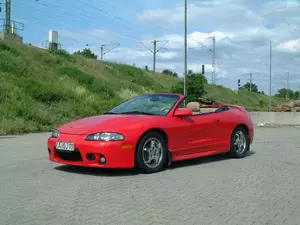
| Vehicle | Curb weight | Difference from world's smallest | Weight to power ratio | 0—60 mph acceleration ratio | Consumption ratio |
|---|---|---|---|---|---|
| GS 2.4 i 16V |
1395 kg / 3076 lbs |
970 kg (2139 lbs) heavier | 9 kg to 1 hp | - | - |
| GT 3.0 i V6 24V |
1485 kg / 3274 lbs |
1060 kg (2337 lbs) heavier | 7 kg to 1 hp | 206 kg/s (454 lbs/s) | - |
| Vehicle | GS 2.4 i 16V |
|---|---|
| Curb weight |
1395 kg / 3076 lbs |
| Difference from world's smallest | 970 kg (970 lbs) heavier |
| Weight to power ratio | 9 kg to 1 hp |
| 0—60 mph acceleration ratio | - |
| Consumption ratio | - |
| Vehicle | GT 3.0 i V6 24V |
| Curb weight |
1485 kg / 3274 lbs |
| Difference from world's smallest | 1060 kg (1060 lbs) heavier |
| Weight to power ratio | 7 kg to 1 hp |
| 0—60 mph acceleration ratio | 206 kg/s (454 lbs/s) |
| Consumption ratio | - |
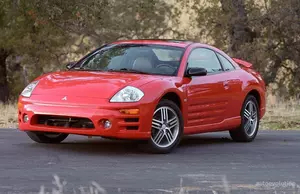
| Vehicle | Curb weight | Difference from world's smallest | Weight to power ratio | 0—60 mph acceleration ratio | Consumption ratio |
|---|---|---|---|---|---|
| 2.4 i 16V |
1295 kg / 2855 lbs |
870 kg (1918 lbs) heavier | 9 kg to 1 hp | - | - |
| GT 3.0 i V6 24V |
1415 kg / 3120 lbs |
990 kg (2183 lbs) heavier | 7 kg to 1 hp | 205 kg/s (452 lbs/s) | - |
| Vehicle | 2.4 i 16V |
|---|---|
| Curb weight |
1295 kg / 2855 lbs |
| Difference from world's smallest | 870 kg (870 lbs) heavier |
| Weight to power ratio | 9 kg to 1 hp |
| 0—60 mph acceleration ratio | - |
| Consumption ratio | - |
| Vehicle | GT 3.0 i V6 24V |
| Curb weight |
1415 kg / 3120 lbs |
| Difference from world's smallest | 990 kg (990 lbs) heavier |
| Weight to power ratio | 7 kg to 1 hp |
| 0—60 mph acceleration ratio | 205 kg/s (452 lbs/s) |
| Consumption ratio | - |
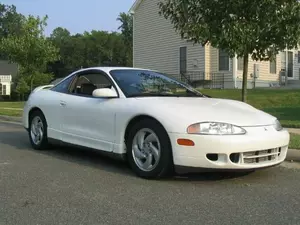
| Vehicle | Curb weight | Difference from world's smallest | Weight to power ratio | 0—60 mph acceleration ratio | Consumption ratio |
|---|---|---|---|---|---|
| 2.0i 16V |
1235 kg / 2723 lbs |
810 kg (1786 lbs) heavier | 9 kg to 1 hp | 139 kg/s (306 lbs/s) |
160 kg/L (353 lbs/L) |
| 2.0 Turbo 16V |
1305 kg / 2878 lbs |
880 kg (1941 lbs) heavier | 6 kg to 1 hp | - |
145 kg/L (320 lbs/L) |
| Vehicle | 2.0i 16V |
|---|---|
| Curb weight |
1235 kg / 2723 lbs |
| Difference from world's smallest | 810 kg (810 lbs) heavier |
| Weight to power ratio | 9 kg to 1 hp |
| 0—60 mph acceleration ratio | 139 kg/s (306 lbs/s) |
| Consumption ratio |
160 kg/L (353 lbs/L) |
| Vehicle | 2.0 Turbo 16V |
| Curb weight |
1305 kg / 2878 lbs |
| Difference from world's smallest | 880 kg (880 lbs) heavier |
| Weight to power ratio | 6 kg to 1 hp |
| 0—60 mph acceleration ratio | - |
| Consumption ratio |
145 kg/L (320 lbs/L) |
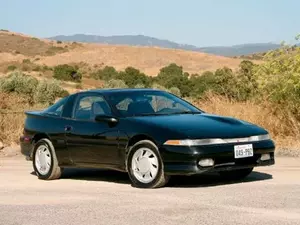
| Vehicle | Curb weight | Difference from world's smallest | Weight to power ratio | 0—60 mph acceleration ratio | Consumption ratio |
|---|---|---|---|---|---|
| 1.8 |
1145 kg / 2525 lbs |
720 kg (1588 lbs) heavier | 12 kg to 1 hp | - | - |
| 2.0 i 16V 4WD Turbo |
1403 kg / 3094 lbs |
978 kg (2157 lbs) heavier | 7 kg to 1 hp | - |
131 kg/L (289 lbs/L) |
| 2.0 i 16V |
1310 kg / 2889 lbs |
885 kg (1952 lbs) heavier | 9 kg to 1 hp | 151 kg/s (333 lbs/s) |
164 kg/L (362 lbs/L) |
| Vehicle | 1.8 |
|---|---|
| Curb weight |
1145 kg / 2525 lbs |
| Difference from world's smallest | 720 kg (720 lbs) heavier |
| Weight to power ratio | 12 kg to 1 hp |
| 0—60 mph acceleration ratio | - |
| Consumption ratio | - |
| Vehicle | 2.0 i 16V 4WD Turbo |
| Curb weight |
1403 kg / 3094 lbs |
| Difference from world's smallest | 978 kg (978 lbs) heavier |
| Weight to power ratio | 7 kg to 1 hp |
| 0—60 mph acceleration ratio | - |
| Consumption ratio |
131 kg/L (289 lbs/L) |
| Vehicle | 2.0 i 16V |
| Curb weight |
1310 kg / 2889 lbs |
| Difference from world's smallest | 885 kg (885 lbs) heavier |
| Weight to power ratio | 9 kg to 1 hp |
| 0—60 mph acceleration ratio | 151 kg/s (333 lbs/s) |
| Consumption ratio |
164 kg/L (362 lbs/L) |